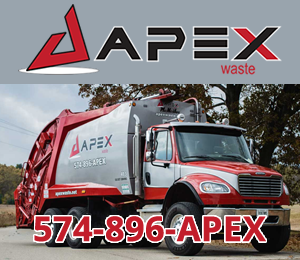State legislatures want to remove some restrictions for heavier trucks on Indiana roadways with Indiana House Bill HB 1190 and Indiana Senate Bill SB 40.
The Senate version of the bill is being put forward by Jon Ford (R – Terre Haute), while the House bill is authored by Jim Pressel (R – Rolling Prairie) and co-authored by Ed Soliday (R – Valparaiso). Soliday authored a similar bill during the previous legislative session where it was referred to the Committee on Roads and Transportation. Pressel is the chair of that committee.
Both proposed laws would allow for heavier trucks on Indiana roadways and ease certain restrictions currently facing heavy haulers. The bills would allow an increase from the current state limit of 80,000 pounds to a maximum of 120,000 pounds. Both bills contain provisions requiring heavy haulers to continue obtaining the necessary permits. Interstate highways in Indiana are restricted to 80,000 pounds under current federal regulations.
The Senate version of the bill would permit metal commodities up to 120,000 pounds. Commodities such as bark, logs, sawdust, wood chips, and agricultural products (excluding bulk milk) up 97,000 pounds would be permitted from the point of harvest to the point of first destination. The Senate version does not list any restrictions on the type of roads over which the loads would operate. The bill also does not provide any specific instructions for the Indiana Department of Transportation to issue permits for these heavier trucks.
The House version of the bill would permit travel only over state highways, avoiding roads under a local authority’s jurisdiction. The house version increases the number of permits allowed by INDOT by ten percent and slowly phases out the limited number of permits over a five-year period. It also contains provisions requiring INDOT to adopt rules for the issuance, fee structure, and enforcement of permits to be issued. The house bill also removes restrictions on commodities.
The surrounding states of Michigan, Kentucky, and Ohio already have provisions for heavier loads. Ohio and Kentucky both have provisions for loads up to 120,000 pounds while Michigan allows for heavy trucks up to 165,000 pounds.
We spoke with State Representative Jim Pressel regarding HB 1190. He stated that “We’re doing this today,” referring to INDOT’s current permitting process for oversize/overweight (OSW) loads.
INDOT already issues permits for heavy loads, but Pressel is optimistic that this bill will help streamline and improve the permitting process. INDOT issues permit under Indiana law for any OSW load and have pre-approved routes for heavy haulers.
Pressel said that he’s also integrated incentives into the bill to encourage truckers to add more axles to their rigs, thereby reducing the wear and tear on Indiana’s roads. “That actually means less trucks on the road,” said Pressel.
“There is no need for heavier trucks,” said Lewie Pugh in a letter obtained by WTCA. Pugh is the executive vice president of the Owner-Operator Independent Drivers Association, a group representing more than 150,000 truck drivers across the nation. OOIDA represents more than 4,000 drivers in Indiana.
In the letter, Pugh states that “At the behest of economic interests that want to ship cheap freight, there is no shortage of state lawmakers willing to pick winners and losers.” He goes on to cite safety concerns of not only truck drivers, but safety for the general public and impending damage to state infrastructure.
According to United States Department of Transportation data obtained from the Coalition Against Biggers Trucks, heavier trucks have much higher crash rates – as much as 400% more in Michigan. These heavier trucks were also involved in more severe crashes and were more likely to roll over, according to the CABT.
Those types of assertions are disputed by Gary Langston, president of the Indiana Motor Truck Association who testified in front of the Committee on Roads and Transportation on February 1. He was in favor of the bill. According to Langston, because of the size and weight of trucks on the road, “…we don’t have small accidents.” He also stated, “It’s not the truck, it’s the driver.” Langston further testified that the number of truck accidents has actually gone down by 70% since 1974 because of increased safety and driver training.
Langston went on to say that the trucking industry in Indiana pays $1.2 billion for roadways and millions of dollars more in permits. He disputed any claims that the trucking industry doesn’t pay its fair share to maintain Indiana roads.
Mark Elrod, a trucker from Peru, Indiana, also testified in front of the committee, saying, “There’s been some fantastic testimony on both sides.” He also stated, “You can’t overcome the laws of physics. A heavier truck is hard to stop.” Elrod challenged Langston’s statement blaming truck drivers for the accidents, saying, “…sometimes it’s not the driver’s fault. Sometimes it’s reaction to other people around him.”
The state’s railroads are concerned about the proposed changes in Indiana’s trucking laws, citing several reasons for challenging the proposed legislation. A local shortline railroad voiced opposition to an increase in truck weight limits, saying it would put their employees and continued investment at risk due to potential shifts of freight from privately maintained rail lines to public highways funded by taxpayers.
Pressel stated that he was not sure why the rail industry was concerned, but he does not expect there will be an impact on freight railroads. “Stuff that goes on rail is probably going to stay on rail,” Pressel said.
Law enforcement officials are also concerned about the proposed legislation. In an opinion piece published in the Journal-Courier by Lafayette Police Chief Patrick Flannelly, “On behalf of law enforcement, first responders and the citizens of Indiana, I respectfully call on the Indiana state legislature to reject heavier trucks on our roads.”
Pressel did admit that there was some opposition to the bill from the Indiana Association of Police Chiefs and the Indiana Sheriff’s Association.
We did reach out to our local state legislatures in the WTCA listening area and asked them to comment on this proposed legislation. We either did not hear back from them or they declined to comment.















